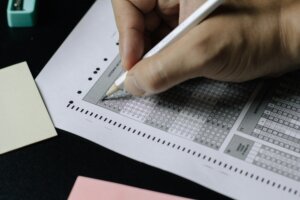 High-stakes exams like the SAT, ACT, LSAT, GRE, GMAT, and MCAT can be stressful for anyone, but for test-takers with disabilities such as ADHD, ADD, Anxiety, or Dyslexia, the stress is greatly exacerbated. Under the Americans with Disabilities Act (“ADA”), the testing entities that administer these exams are obligated to provide test-takers with disabilities the accommodations necessary to assure they “are not foreclosed from educational, professional, or trade opportunities.” 42 U.S.C. § 12189. The Department of Justice (“DOJ”) has expanded on the meaning of the legal obligations of entities administering high-stakes exams by noting that such entities are required to administer their “exam so that it accurately reflects an individual’s aptitude, achievement, level, or the skill that the exam purports to measure, rather than the individual’s impairment.” U.S. Dep’t of Just., ADA Technical Assistance Document: Testing Accommodations 4, https://archive.ada.gov/regs2014/testing_accommodations.pdf (last visited June 21, 2024).
High-stakes exams like the SAT, ACT, LSAT, GRE, GMAT, and MCAT can be stressful for anyone, but for test-takers with disabilities such as ADHD, ADD, Anxiety, or Dyslexia, the stress is greatly exacerbated. Under the Americans with Disabilities Act (“ADA”), the testing entities that administer these exams are obligated to provide test-takers with disabilities the accommodations necessary to assure they “are not foreclosed from educational, professional, or trade opportunities.” 42 U.S.C. § 12189. The Department of Justice (“DOJ”) has expanded on the meaning of the legal obligations of entities administering high-stakes exams by noting that such entities are required to administer their “exam so that it accurately reflects an individual’s aptitude, achievement, level, or the skill that the exam purports to measure, rather than the individual’s impairment.” U.S. Dep’t of Just., ADA Technical Assistance Document: Testing Accommodations 4, https://archive.ada.gov/regs2014/testing_accommodations.pdf (last visited June 21, 2024).
Testing entities that administer high-stakes exams can, and typically do, require that test-takers with disabilities submit documentation of their relevant diagnoses and accommodations history with their request for testing accommodations. Even with such documentation, it is not uncommon for testing entities to deny—in full or in part—the requested accommodations. This arduous process makes it all the more difficult for test-takers with disabilities to receive the accommodations needed to perform on equal footing with their non-disabled peers. Applicants for testing accommodations should keep the following in mind as they navigate the process of applying for testing accommodations.
1. Just because you have been successful academically does not mean you are precluded from receiving testing accommodations.
Far too often, society tells us that people who have achieved average or moderate academic success are either not disabled or are “not disabled enough” to warrant accommodations. This notion is wrong. The mere fact that someone has been successful academically without accommodations does not preclude them from receiving testing accommodations.
Under the ADA, a disability is “a physical or mental impairment that substantially limits one or more major life activity.” 42 U.S.C. § 12102(1)(A). Among others, learning disabilities, ADHD, and generalized anxiety generally constitute “disabilities” for purposes of the ADA and receiving testing accommodations. Despite this, testing entities continue to deny accommodations to applicants that have achieved average scores on previous standardized tests without accommodations. To get ahead of this, when applying for testing accommodations, highlighting contrasts in performance can be particularly helpful. For example, if you performed well academically without accommodations but later performed even better with accommodations, highlighting that contrast in your personal statement can be especially persuasive.
On the other hand, if you have performed well academically without ever receiving accommodations, documentation explaining the extent to which coping strategies were developed and used can be highly effective. Coping strategies may range from test taking tactics such as only reading the answer choices on timed exams to regimented study plans that involve significantly more study time than peers. In addition to highlighting the coping strategies developed and employed in your personal statement, additional supporting documentation could consist of letters from or observations of past teachers, tutors, doctors, or even family members describing the development and use of said coping strategies.
2. Be creative with what documentation you submit.
Testing entities generally outline what type of documentation they require from applicants seeking accommodations. Documentation typically falls into one of five categories: medical documentation, personal statement, proof of prior accommodations, test score reports, and transcripts. Further, historical documentation can be relevant in addition to more recent documentation.
Think creatively about what type of documentation you submit to prove your need for accommodations, especially if you have never received formal accommodations or did not receive a diagnosis until later in life. DOJ guidance makes clear that a failure to receive formal testing accommodations in the past does not preclude an applicant from receiving testing accommodations in the present. In the absence of a history of past accommodations, documentation such as past teachers’ or professors’ observations can be persuasive. Letters from family members explaining why accommodations or diagnoses were never sought can also help in some circumstances. Further, your personal statement can be utilized to highlight any obstacles that prevented you from receiving a diagnosis or accommodations. A lack of “traditional” documentation does not necessarily mean you will not be granted accommodations.
3. Be critical of reasons cited for denying your requested accommodations and craft a persuasive appeal.
The unfortunate reality is that it is far from uncommon for testing entities to deny requested accommodations. If you are denied accommodations, be critical of the reasons cited for the denial. Common reasons for denial include: finding the applicant’s documentation insufficient to establish their disabilities; claiming the applicant’s disabilities do not warrant accommodations because they are not severe enough; faulting applicant’s delayed diagnosis or failure to apply for accommodations on past high-stakes exams; and determining that the applicant must not have disabilities that require accommodations because they have performed average or above average on past tests. Not all of these rationales pass muster under the ADA.
Testing entities typically have a tight window in which they’ll accept appeals or requests for reconsideration, so it is important to be prepared to draft a persuasive appeal letter if necessary. To the extent possible, obtaining supplemental evidence (e.g., new neuropsychological evaluations confirming diagnoses, clarifying letters from doctors addressing the testing entities’ concerns) or seeking a lawyer’s help can make your appeal easier. Citing the DOJ’s guidance on ADA requirements for testing accommodations to identify why the denial violated the ADA will strengthen the appeal.
For example, if the denial fails to defer to past accommodations that you have received, highlight those past accommodations and the DOJ’s guidance that “[p]roof of past testing accommodations in similar test settings is generally sufficient to support a request for the same test accommodations for a current standardized exam or other high-stakes test” in your appeal letter. Conversely, if a reason cited for denial is a lack of history of receiving testing accommodations, consider updating your personal statement to explain why you did not apply earlier (e.g., stigma, coping mechanisms that worked before subject material got progressively more difficult, etc.) and highlight the DOJ’s guidance that a lack of prior testing accommodations does not mean they are not needed now.
If you have questions about this topic or believe you or someone you know has been improperly denied testing accommodations, please contact us today for a consultation.
This blog post was primarily authored by BGL summer associate, Erin Turvey. At the time of publication, Erin is a 3L at the University of Baltimore School of Law, where she is in the top of her cohort and serves as an editor for the University of Baltimore Law Review. She has a strong interest in social justice and a career in public interest lawyering and was drawn to BGL’s reputation and work in disability rights law. Erin previously interned with Maryland Legal Aid, where she strengthened her passion for public interest work by drafting key case materials and observing courtroom procedures. She also obtained significant behind-the-scenes legal experience as a judicial intern with the Appellate Court of Maryland.
